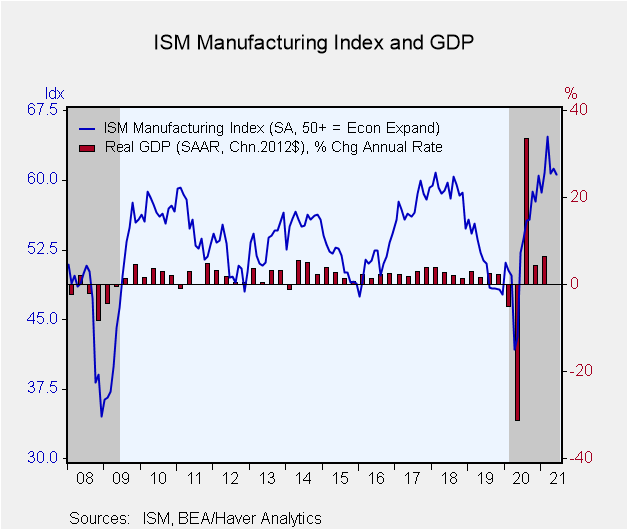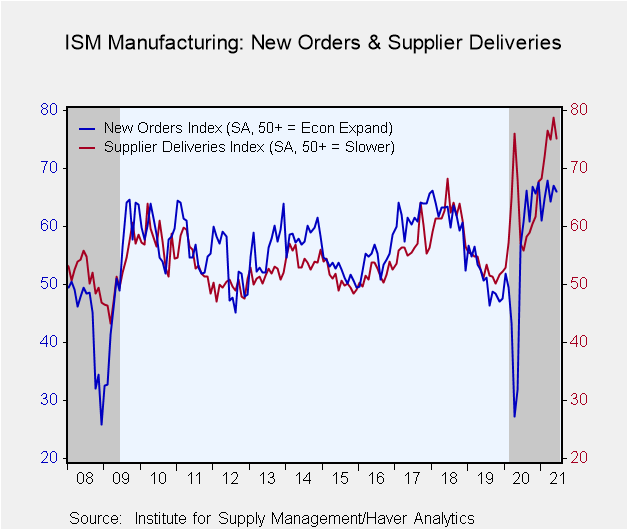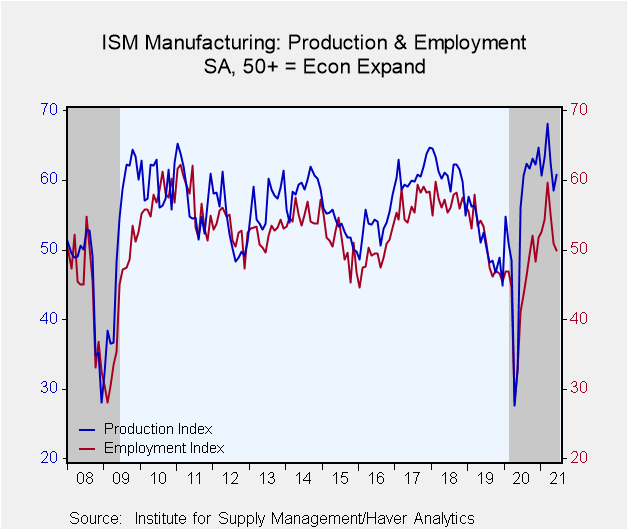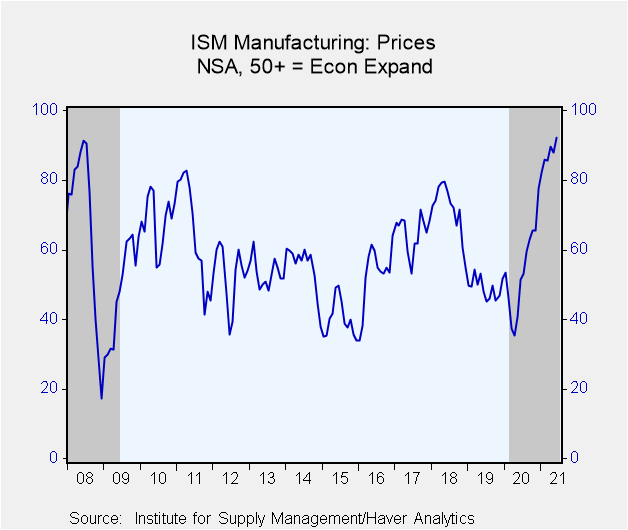 Global| Jul 01 2021
Global| Jul 01 2021ISM Manufacturing Index Eases in June
by:Tom Moeller
|in:Economy in Brief
Summary
• Factory activity expands for 13th consecutive month. • Component movement is mixed. • Price increases continue to be broad-based. The Institute for Supply Management (ISM) reported that its Composite Index of Manufacturing Sector [...]
• Factory activity expands for 13th consecutive month.
• Component movement is mixed.
• Price increases continue to be broad-based.
The Institute for Supply Management (ISM) reported that its Composite Index of Manufacturing Sector Activity slipped to 60.6 during June, falling back after its May increase to 61.2. A reading of 61.1 had been expected in the Action Economics Forecast Survey. During the last 15 years, there has been a 42% correlation between the composite index and the quarterly change in real GDP. Before the recession began, there had been a 67% correlation.
Movement amongst the component series was mixed in June. A lower new orders reading led last month's slowdown, declining to 66.0 after rising to 67.0 in May. The figure has been near the current level since October of last year. The supplier deliveries reading fell to 75.1 from 78.8. It continued to indicate dramatically slower product delivery speeds versus two years ago. Fifty-four percent (NSA) of respondents reported slower speeds while three percent reported a quickening. Working higher was the production index to 60.8 after declining to 58.5 in May. The inventories index rose slightly to 51.1, the highest level since October.
The employment index fell to 49.9 during June from 50.9 in May. Indicating a marginal decline in payrolls, it brought the reading to the lowest since November of last year. An increased 26.6% (NSA) of respondents reported more hiring, up from 20.8% in May. An increased 19.3% reported fewer jobs, up from 7.2% three months earlier.
The prices paid index jumped to 92.1 last month after easing to 88.0 in May. It was the highest point since July 1979. A strengthened 84.8% of respondents reported higher prices while only 0.7% reported them lower.
Amongst other ISM series not included in the composite, the order backlog figure fell sharply to 64.5 (NSA), but remained well above 45.3 twelve months earlier. The new export measure edged higher to 56.2 from 55.4. The figure remained down versus a November high of 57.8.
The ISM figures are based on responses from over 400 manufacturing purchasing executives from 20 industries, which correspond to their contribution to GDP in 50 states. These data are diffusion indexes where a reading above 50 indicates expansion. The figures from the Institute for Supply Management can be found in Haver's USECON database; further detail is found in the SURVEYS database. The expectations number is available in Haver's AS1REPNA database.
| ISM Mfg (SA) | Jun | May | Apr | Jun'20 | 2020 | 2019 | 2018 |
|---|---|---|---|---|---|---|---|
| Composite Index | 60.6 | 61.2 | 60.7 | 52.2 | 52.5 | 51.2 | 58.9 |
| New Orders | 66.0 | 67.0 | 64.3 | 56.7 | 54.0 | 51.2 | 61.6 |
| Production | 60.8 | 58.5 | 62.5 | 56.0 | 53.8 | 51.3 | 60.9 |
| Employment | 49.9 | 50.9 | 55.1 | 41.1 | 44.3 | 50.9 | 56.9 |
| Supplier Deliveries | 75.1 | 78.8 | 75.0 | 57.0 | 61.6 | 52.9 | 62.0 |
| Inventories | 51.1 | 50.8 | 46.5 | 50.2 | 48.8 | 49.9 | 52.9 |
| Prices Paid Index (NSA) | 92.1 | 88.0 | 89.6 | 51.3 | 54.0 | 49.1 | 71.7 |
Tom Moeller
AuthorMore in Author Profile »Prior to joining Haver Analytics in 2000, Mr. Moeller worked as the Economist at Chancellor Capital Management from 1985 to 1999. There, he developed comprehensive economic forecasts and interpreted economic data for equity and fixed income portfolio managers. Also at Chancellor, Mr. Moeller worked as an equity analyst and was responsible for researching and rating companies in the economically sensitive automobile and housing industries for investment in Chancellor’s equity portfolio. Prior to joining Chancellor, Mr. Moeller was an Economist at Citibank from 1979 to 1984. He also analyzed pricing behavior in the metals industry for the Council on Wage and Price Stability in Washington, D.C. In 1999, Mr. Moeller received the award for most accurate forecast from the Forecasters' Club of New York. From 1990 to 1992 he was President of the New York Association for Business Economists. Mr. Moeller earned an M.B.A. in Finance from Fordham University, where he graduated in 1987. He holds a Bachelor of Arts in Economics from George Washington University.
More Economy in Brief
 Global| Feb 05 2026
Global| Feb 05 2026Charts of the Week: Balanced Policy, Resilient Data and AI Narratives
by:Andrew Cates










